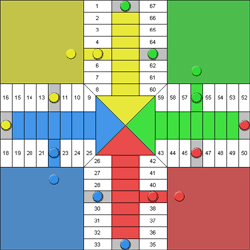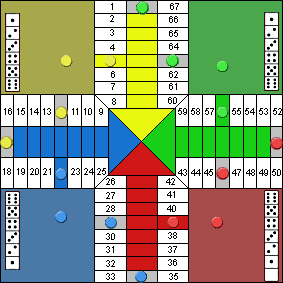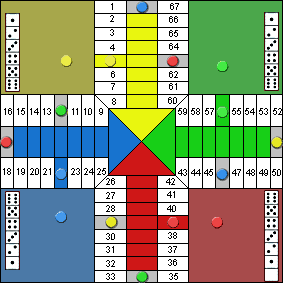|
 |
Origin
Usually parcheesi players perceive that our strategy is very good and we doesn´t miss a thing, but we are dogged by bad luck.
In order to give the players the option to show unequivocally their big ability to perform calculations, strategy and concentration, we have thought about creating a new version of parcheesi with no random events. The result is the parcheesi without dice, that, due to the look of the board, could be also called the parcheesi of the 7 dice.
It is the first game especially designed to be played in Ludoteka.com.
The goal and rules oif the game
The basic rules are the same as parcheesi, except the way of obtaining the number of cells that pieces may move forward in each turn. So, only the specific rules that difference this game from traditional parcheesi will be explained:
- The game may be played on the four colours board, and is designed for two or four players; when the number of players is four, they form two teams.
- At the start of the game there are 3 pieces of each color out of the home, placed in two possible shapes: grouped, each colour on the first sure cells of their own routes; and alternated, being the first two pieces of each colour more advanced, so that all the colours are alternated on the route. The initial phase of the game passes very fast and captures may be possible since the first moves, specially when pieces start in the alternated mode.


- Dice is only used to decide who is the first player to move, in the same way as the standard parcheesi.
- In every move the player decides the number to use in the advance, except extra moves of 10 or 20 cells after finishing the route or capturing. The advance is made according to the usual rules: 5 to start the route, 6 forces to open barriers, the pieces of the partner may be moved when own pieces cannot,...
- The used number remains disabled until all the possibilities between 1 and 6 runs out.
- As usual, when the elected number is 6, the same player plays again.
- The 6 numbers become enabled when all of them are used, and a new cycle starts; so, all players renew their numbers once every five turns.
- Any of the numbers may be always used if it is enabled, even it there is not any own piece available to advance the corresponding number of cells. For example, playing by pairs, if one player has all the pieces at home, it is possible to place any of them in the route using the 5, or move a partner´s piece using another number.
- The pass or roll zero: this rule is introduced to avoid being always the same player who renews the six numbers in first place. There is always one player who is forced to pass in any move before enabling again the numbers. At the start of the game it is the first player, and the roll zero rotates to the next player each time the numbers are renewed.
- The only rule that is never applied is the 3 sixes in a row case, since it can´t happen. However, players may use twice in a row the six, saving it to the final of the group and using it to open the next one.
Moving the pieces
The option to advance different number of cells with each piece complicates the marking of the moves; looking for being the games as fast and dynamic as possible, the program gives the option to mark the moves in several ways:
- Forced moves are automatic, although this is not very frequent.
- If any piece may be moved only with one of the available numbers, the move may be done simply by clicking on the piece.
- If any cell may be only reached by one of the pieces, the move may be done by clicking on the destination cell; this is usually the fastest method to mark the move, but you should be careful because it may be easy to make mistakes thinking about the piece that may reach the cell.
- In any case, you may drag and drop the piece, as done in most of the board games.
- Finally, you may mark in first place the number to use, and click on the piece to move.
Remark about the game
Games tend to be longer because usually there is wide range of possibilities for every move and every decision must be thought because the opponents have also many options to response. It is recommended to configure the game with a longer time of response than standard parcheesi.
Play now
Copyright © 2001-2026 Ludoteka.com Jokosare S.L. All rights reserved - Disclaimer - Cookies - Contact
